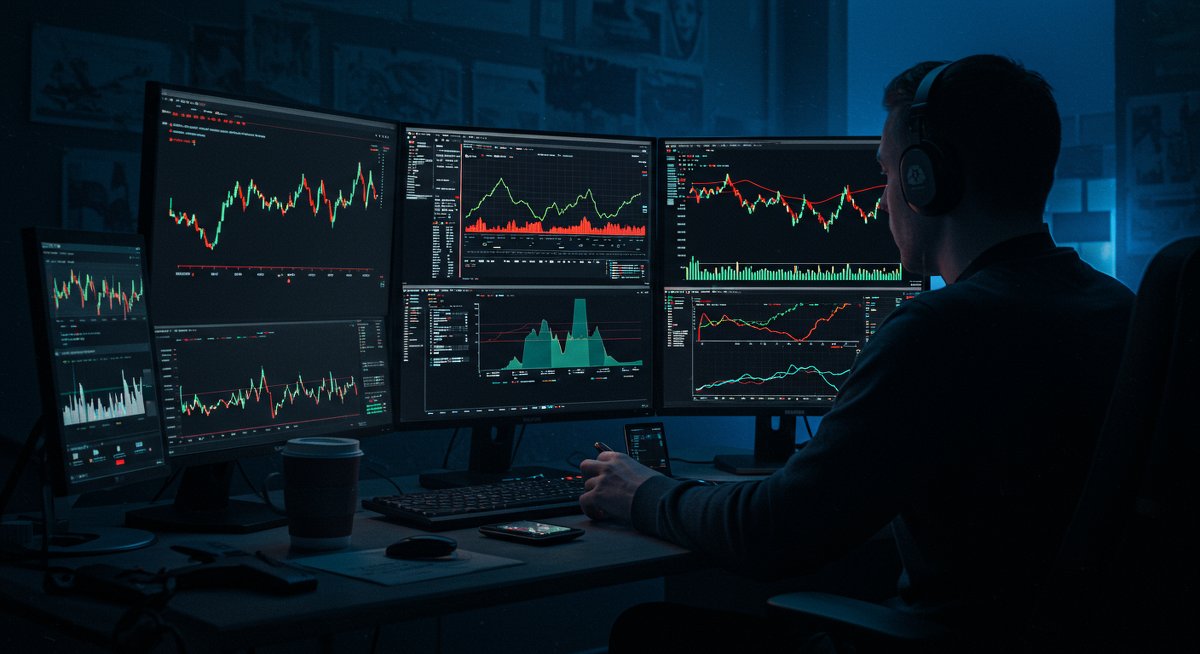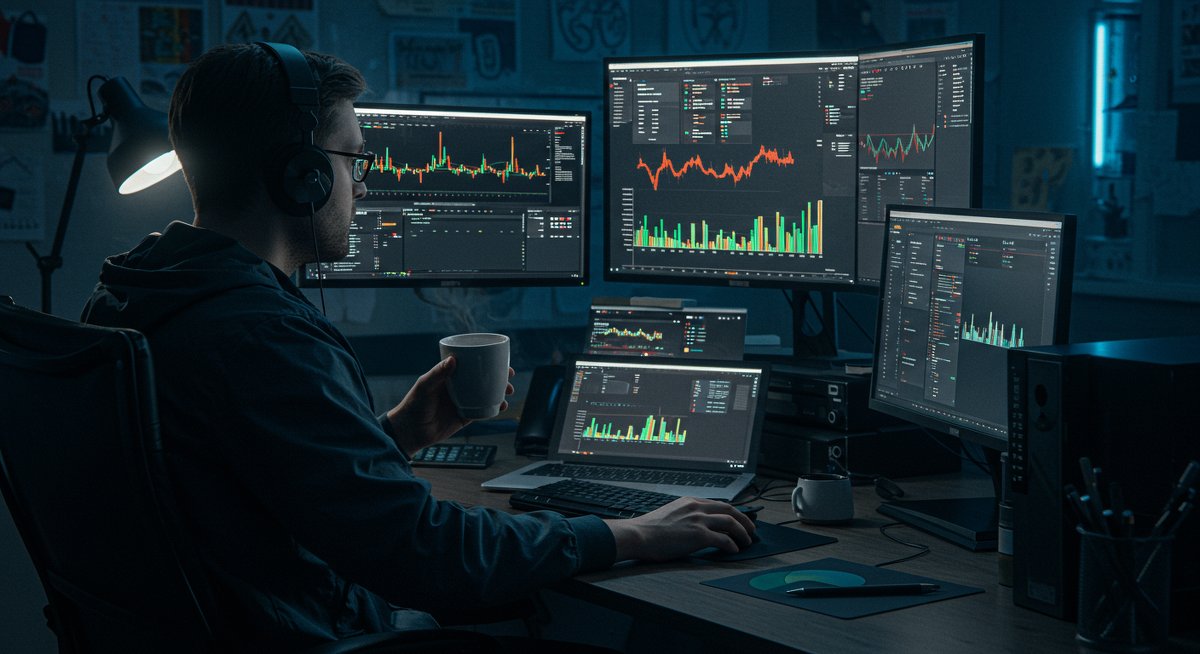That Bitcoin Post That Got Me Thinking...
So, I was scrolling through r/Bitcoin the other day, and I saw this post that really resonated with me. It was simple, just a few lines: "Who needs to hear this today?! Patience is key. Markets are simply a transfer of wealth from the unpatient to the patient. Which one will you be?!" It got over 300 upvotes, which tells you something – people feel this.
It's so easy to get caught up in the hype, the fear, the constant price swings. Especially in the world of Bitcoin trading, where a single tweet can send the market into a frenzy. You see the charts going up, you get FOMO (fear of missing out), and you jump in without a plan. Or, you see the charts crashing, panic sets in, and you sell at a loss. I've been there, done that, and it usually doesn't end well. What that Reddit post highlighted for me is that Bitcoin trading, especially for those of us trading internationally, really demands a different mindset. It's not about getting rich quick. It's about playing the long game, understanding the risks, and being patient enough to ride out the volatility. That's what I want to dive into here.

What's Really Behind the Bitcoin Hype?
Let's break down what's actually happening when we see these big price swings. A lot of it is driven by pure emotion. Bitcoin, more than a lot of other assets, has this almost cult-like following. People are passionate about it, they believe in its potential, and that passion can lead to irrational decisions. You'll see influencers pumping coins, spreading hype, and creating artificial demand. Then, on the other side, you'll have negative news, regulatory concerns, or just general market uncertainty triggering panic selling. This kind of volatility is magnified when you're dealing with a global market, where different countries have different regulations, different levels of adoption, and different economic factors influencing trading behavior.
Think about it this way: If you're trading Bitcoin in the US, you might be focused on what the SEC is doing. But if you're in Asia, you might be more concerned about what's happening with Chinese regulations. These different perspectives and pressures create a constant push and pull, and that's where the opportunities – and the risks – arise. The core of it, though, goes back to that Reddit post: The people who make money consistently aren't the ones reacting to every single headline. They're the ones who've done their research, have a strategy, and stick to it, regardless of the short-term noise.
How Patience Can Actually Make You Money
So, how does this whole patience thing translate into actual profits? Well, for starters, it helps you avoid making stupid mistakes. When you're panicking or chasing pumps, you're way more likely to make impulsive decisions you'll regret later. You might buy high, sell low, or get rekt by leverage trading. Patience allows you to step back, analyze the situation, and make informed decisions based on data, not emotion. But more than that, patience allows you to take advantage of market cycles. Bitcoin, like any other asset, goes through periods of boom and bust. There will be bull markets where prices skyrocket, and bear markets where they crash.
If you're patient, you can accumulate Bitcoin during the dips, when everyone else is selling. Then, when the market recovers (as it historically always has), you're in a position to profit. This is classic "buy low, sell high" strategy, but it requires the discipline to resist the urge to sell when things get scary. And if you’re trading internationally, patience also means understanding different market cycles in different regions. For example, a regulatory crackdown in one country might create a buying opportunity in another. Or, a surge in adoption in a specific region might signal a long-term growth trend.
The Stuff Nobody Talks About: Managing Risk
Okay, let's be real. I'm not saying that patience is a magic bullet that guarantees profits. Bitcoin trading is risky, period. You can lose money, and you need to be prepared for that. The key is to manage your risk effectively, so you don't get wiped out by a single bad trade. This is the stuff that most of the “get rich quick” gurus leave out. First of all, never invest more than you can afford to lose. This is Crypto 101, but it's worth repeating. If you're betting your life savings on Bitcoin, you're setting yourself up for disaster. Second, diversify your portfolio. Don't put all your eggs in one basket. Bitcoin is great, but it's not the only cryptocurrency out there. Consider investing in other assets, too, to spread your risk.
And third, use stop-loss orders. These are automated orders that sell your Bitcoin if it drops to a certain price. They can help you limit your losses in a volatile market. Beyond these basics, consider things like cold storage for your Bitcoin. Don't leave your coins on an exchange if you're not actively trading them. Get them off the exchange and into a hardware wallet where you control the private keys. It's a safer way to hold your Bitcoin long-term. For international traders, risk management also means understanding the regulatory landscape in your country. What are the tax implications of trading Bitcoin? Are there any restrictions on buying or selling Bitcoin? Make sure you're compliant with all local laws to avoid legal trouble.
If You're Trading from Outside the US: Extra Steps
Now, let's talk specifically about international Bitcoin trading. If you're not in the US, there are a few extra things you need to consider. First, you need to find a reputable exchange that operates in your country. Not all exchanges are available worldwide. Some exchanges may have restrictions on who they can serve. Do your research and make sure the exchange you choose is compliant with local regulations. Also, be aware of currency exchange rates. When you're trading Bitcoin in a currency other than USD, you need to factor in the exchange rate fluctuations. These fluctuations can eat into your profits, so it's important to keep an eye on them.
Another key thing is to understand the local tax laws surrounding Bitcoin trading. Many countries are still figuring out how to regulate cryptocurrencies, so the tax rules can be confusing or inconsistent. It's best to consult with a tax professional in your country to make sure you're complying with all applicable laws. And finally, be aware of scams and fraud. The cryptocurrency world is full of scammers trying to take advantage of unsuspecting traders. Be wary of anyone who promises guaranteed profits or asks you to send them Bitcoin. Never give out your private keys to anyone. Do your due diligence and only trade with reputable platforms.

Actually Doing This Stuff: A Step-by-Step Guide
Okay, so how do you actually put all this into practice? Here's a step-by-step guide to patient, profitable Bitcoin trading:
- Do Your Research: Before you buy any Bitcoin, take the time to understand the market, the technology, and the risks. Read whitepapers, follow industry news, and learn about technical analysis.
- Develop a Strategy: Decide what your goals are. Are you trading for short-term profits, or are you holding for the long term? What's your risk tolerance? What are your entry and exit points? Having a strategy will help you stay disciplined.
- Choose a Reputable Exchange: Find an exchange that's licensed and regulated in your country. Look for an exchange with good security, low fees, and a wide range of trading pairs. KuCoin is a good option for experienced traders. For beginners, Changelly is user-friendly.
- Start Small: Don't bet the farm on your first trade. Start with a small amount of Bitcoin that you can afford to lose. This will give you a chance to learn the ropes without risking too much capital.
- Be Patient: This is the most important step. Don't panic sell when the market dips. Don't chase pumps when the market rallies. Stick to your strategy and wait for the right opportunities.
- Manage Your Risk: Use stop-loss orders, diversify your portfolio, and never invest more than you can afford to lose.
- Stay Informed: Keep up with the latest news and developments in the cryptocurrency world. This will help you make informed decisions and adjust your strategy as needed.
My Take on All This: It's a Marathon, Not a Sprint
So, here's what I think. Bitcoin trading is not a get-rich-quick scheme. It's a long-term investment strategy that requires patience, discipline, and a good understanding of risk. If you're looking for instant gratification, you're probably going to be disappointed. But if you're willing to put in the time and effort to learn the ropes, and if you can resist the urge to panic sell when things get tough, you have a good chance of making money in the long run. Remember that Reddit post: Markets are a transfer of wealth from the impatient to the patient. Which one will you be? I’m choosing patience.
Maybe I'm wrong. Maybe Bitcoin is going to crash to zero tomorrow. But even if it does, I'll be okay, because I've managed my risk, I've diversified my portfolio, and I've only invested what I can afford to lose. And that's the most important lesson of all.